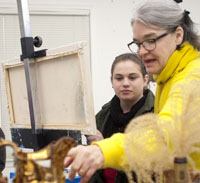Why I Give: Q&A With Rebecca Dixon ’60

Rebecca Dixon ’60
Q. Tell us a little about your life today.
A. A couple of years before I was to retire in 2005, I trained to become a volunteer docent for the Chicago Architecture Center. For the ensuing 18 years, it has remained a rewarding activity—explaining Chicago’s history, architecture and related design; greeting people from all over the world; enjoying fellow docents; and getting outdoor exercise.
Six years ago, I moved from Evanston, IL, where I had most recently worked at Northwestern University, to a senior citizen residence in Chicago, just off Michigan Avenue near the Water Tower. Now, I can walk to the Architecture Center or River Cruise, am only a few blocks from Fourth Presbyterian Church where I’m very active, and have many friends within walking distance. Most of my family members are still in Staunton, Roanoke, or Richmond, and I am pleased to be able to visit home territory, including Lynchburg…when conditions allow.
Q. What is your fondest memory of the College?
A. My strongest memory of the College is the great education I got. I loved the variety, of being challenged, of doing research, even in the musty underground library stacks. Today, I still have and even occasionally refer to three textbooks: one on the Old Testament written by my Randolph professor, my art history text, and the music appreciation text we used. Recently, I read a write-up I prepared for the memoir class I’m enjoying. In the critique afterward, a classmate said, “I think you had a great liberal arts education.”
Why do you support Randolph College?
A. Family circumstances prompted me to formalize estate plans many years ago. In addition to concern and love for family members, I carefully chose only two other eventual beneficiaries, the College as one of them. Initially, I was identified as one of the “anonymous” benefactors in the named-gift column. A few years later, I asked that my name be published, hopeful that action might motivate others. Simply put, Randolph College has made a tremendous difference in my life. Without the financial aid given me, I could not have attended what my father with only an eighth-grade education characterized as “the best college in Virginia.” I want to support its ongoing strength and influence for the benefit of others. I was a trustee during the years we transitioned to coed, a decision I strongly supported. I am especially pleased with the character now of the student body.
My annual gifts to the College over many years reflect my gratitude to my alma mater for the ongoing “gift” of my educational experience there. Provision in my estate plans reflects my continued support and hope for similar experiences for students there today. It is important that both the Randolph family and those thinking about becoming a part of that family know my intentions. I urge new graduates to reflect on their Randolph experience and commit to staying in touch with the College’s faculty, staff, students, and fellow graduates, and commit to contributing annually. That richness of connection will last your lives long.
Connect to Future Generations
Like Rebecca, you can make a gift that expresses your gratitude for a Randolph College education. To learn more about opportunities that meet your needs and support the College’s future, contact The Planned Giving Office at 434-485-8050 or plannedgiving@randolphcollege.edu.

